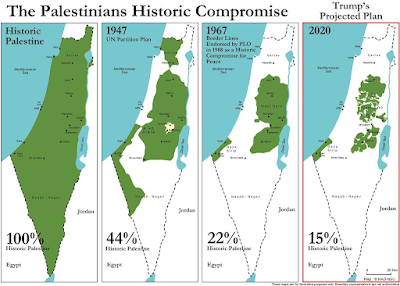I know this is probably a foolish piece for me to write as it will not change any dynamics while probably stirring disenchantment with me among readers on all sides. But having been there before, I simply cannot remain silent in the face of the renewal of the long running Israel-Palestine war.
My 2003 book, ROGUE NATION - American Unilateralism and the Failure of Good Intentions, was written in the wake of 9/11 in an attempt to show the American public that despite its very good intentions America’s perceptions of itself and its international role were (are) greatly at odds with reality and with the perceptions of much of the rest of the world, and especially of the Arab world.
What I am seeing on the TV screen as I write now is proof positive that despite mine and the efforts of many others, nothing has changed. Indeed, the misperceptions, false assumptions, half truths, and outright lies have only gotten worse. The reporting admits of no history, of no possible causes other than sheer barbarism, and of no solutions other than completely wiping the “barbarians” and the people of their lineage out.
A LITTLE HISTORY
Let me take you back to the beginning of the Arab/Palestinian-Jewish/Israeli conflict. Some may say, with justification, that it goes all the way back to Abraham and his two sons - Ishmael (father of the Arabs) and Isaac (father of the Jews). But today’s conflict really began in the late 19th century when Jewish leaders in Europe like Theodore Herzl, Leo Pinker, and Moses Hess began promoting the idea of enabling Jews to escape the discrimination they often suffered in Europe by emigrating to Palestine, the ancient homeland of the Jews around Jerusalem which was then part of the Turkish Ottoman Empire. In reading their early writings, it is fascinating to observe that they seemed completely unaware that the area had long been and was then occupied by Arabs. Indeed, they ventured to speak of “ a land without people for a people without land.”
Consider that for just a moment. Either they just did not know that in fact there were a lot of people there or they did not consider the then present inhabitants to be people.
As the project proceeded, friction between immigrant Jews and resident Arabs quickly arose as it became ever clearer that the newcomers had no intention of becoming part of the local life, but aimed rather to build their own separate and very different society. Indeed, Chaim Margalit Kalvarisky, a one time Jewish Colonization Association manager, once noted that he felt “compassion” for the Arabs and that twenty five years of dispossessing them had been hard, but he had had no choice because the Jewish public demanded it. The Jewish philosopher and writer Ahad Ha’am noted prophetically, “We have to treat local populations with love and respect… and What do our brethren in the Land of Israel do (note that even at this early date when there were virtually no Jews there, it was being called the Land of Israel)? Exactly the opposite. Should the time come when the life of our people in Palestine imposes on the natives, they will not easily step aside.”
World War I brought a pregnant moment when, in an effort to marshal Jewish support for the allied cause in Europe and the U.S., British Foreign Minister Lord Balfour issued the “Balfour Declaration” which called for eventual “establishment in Palestine of a national home for the Jewish People.” He added that “Zionism, good or bad, is of far profounder import than the desires and prejudices of the 700,000 Arabs who now inhabit the ancient land.”
Of course, this happened to be at odds with the views of Henry McMahon, Britain’s High Commissioner for Egypt who was trying to incite an Arab revolt against Germany’s allies, the Ottoman Turks. He went so far as to send a letter to Arab leader Sharif Hussein promising independence to the Arabs in the Ottoman-ruled provinces if they would rise up against the Turks. Indeed, he even sent the letter along with a person charged with assisting such an uprising - one T.E. Lawrence (of Arabia).
These promises collided at the Versailles Peace Conference where President Woodrow Wilson allowed his prejudices to overcome his devotion to national self-determination noting that “undeveloped peoples” would need “guidance” from administering powers under mandates from the League of Nations. London, having long forgotten Lawrence and the Arab revolt pushed hard to be awarded the Mandate for Palestine. Wilson’s King-Crane Commission was sent to investigate local sentiment and found strong opposition to the Zionist program among the area’s Christian-Muslim majority as well as a desire for an American Mandate. The Zionists, who surmised that America would insist on majority rule that would put Arabs in control, strongly opposed any American presence. ( the Zionists did not “stand with America” ). Rather, they strongly preferred Britain and the Balfour Declaration. Wilson went along, and the Brits wound up in charge of Palestine. (France got Lebanon).
The Mandate turned out to be unhappy and nothing but trouble for Britain. As immigrants poured in from Europe with financing from the Colonization Association, tensions with the Arab population led to frequent riots. But when the Brits tried to restrict immigration, they wound up with serious conflicts with the Zionist groups who had significant political influence in London.
This all got lost in the tumult of WWII, but with the end of the war, millions of Holocaust survivors turned their steps toward Palestine. Fearful of massive displacement, the Arabs resisted further Jewish immigration, and the Brits again imposed restrictions. But now a new player named the Irgun entered the game. A Jewish underground army (the father of today’s Prime Minister Binjamin Netanyahu was a key Irgun leader) that had been fighting Arabs, it now turned its guns and bombs on the British, blowing up, among other things, the King David hotel which served as the British army’s headquarters in Palestine. Deciding that the game was no longer worth the candle, the Brits gave their Mandate back to the United Nations and left Palestine in 1948.
The UN proposed a two state solution with Jerusalem internationalized. This was rejected by the Arabs who declared war on the newly form Israel and promptly lost the fight, leaving Palestine and Jerusalem along an armistice line that now constitutes the internationally recognized Israeli border. About 750,000 Palestinian refugees from the area that was now Israel were left stranded in camps in the West Bank, Gaza, and other countries like Jordan and Lebanon. Nothing fundamental changed until 1967 when the Six Day War left Israel in charge of the West Bank and Gaza and gave rise to the Israeli settler movement setting the stage for decades of struggle, terrorist attacks, war in Lebanon, UN resolutions calling for peace negotiations and various more or less aimless “peace talks.”
The first “Intifada” of 1987-89 and the Gulf War of 1990-91 began to create movement. U.S. President George H.W. Bush called for a peace conference in Madrid and also for a halt to Israeli settlement construction, which U.S. aid was inevitably underwriting. Indeed, Bush suspended certain aid flows to Israel. At the same time, the election of Yitzhak Rabin as Israeli Prime Minister led to an agreement between the two sides in Oslo under which Israel would gradually withdraw its army from some occupied areas and transfer responsibilities for such things as education, health, and police to Palestinian governance. The deal also committed the Palestinians to recognition of Israel’s right to exist and to renunciation of all acts of violence.
As long as Rabin was in charge, things moved steadily, if slowly, in a good direction. But his assassination in late 1995 by an Israeli, I repeat, an Israeli shooter resulted in what the shooter and his backers obviously wanted which was an unwinding of the whole peace process.
ARAFAT AND DESPERATE EFFORTS
Yasir Arafat, for many years a major thorn in the Israeli side and even caused by Israel to be exiled from Lebanon to Tunis at one point, had been resurrected by Rabin to be his (Rabin’s) key interlocuter for peace negotiations. Rabin’s untimely death was a huge loss to both the Palestinians and the Israelis, but Arafat managed to stay in the game for quite a while longer and during his period of leading the Palestinians there occurred perhaps the best opportunity for a long term, peaceful resolution of the Israeli-Palestinian conflict.
I met him in the summer of 2002 at his then headquarters in Ramallah just outside of Jerusalem. I had requested the meeting a couple of weeks in advance and at 3 p.m. on August 10, I received a call telling me that “Chairman Arafat can see you, but you must be at the Ramallah checkpoint at 5 p.m. Since Ramallah is essentially a suburb of Jerusalem, under normal circumstances it should not take more than a half hour to get there and to see Arafat. But nothing about the West Bank is normal. About 400 kilometers of special roads are reserved for Israeli settlers while Palestinians must stop at endless checkpoints to have their vehicles and whatever they are carrying inspected. It can take hours to go a couple of miles.
Once through the checkpoint, my car headed with difficulty to the Muqata, Arafat’s headquarters. The roads had been rutted and crushed by Israeli army tanks that were now surrounding the Muqata with guns leveled at Arafat by order of the new Israeli Prime Minister and former Israeli army general Ariel Sharon who succeeded Rabin. Unlike Rabin, Sharon had no use for Palestinians and certainly not for Arafat.
When I finally reached his presence at the sandbagged entrance of the Muqata, I was quite surprised to see a very small man whose hand almost disappeared in my own more or less average male hand as we greeted each other with a handshake.
In his small, simply furnished and telegram/memo laden office he had gathered the top leadership of his Palestinian Authority team. He was at pains to explain that he was not directing or instigating terror attacks on Israel. Noting that the Israeli army had more or less destroyed all the Palestinian Authority’s police stations and public offices, including closing Palestinian universities and taking computer hard drives, he argued that he had little capability to direct anything. “Bush” he said, “calls for reform and elections, but how can we hold elections when we can’t even make a telephone call?” He attributed recent suicide bombing extremist Hamas and Islamic Jihad organizations that were competing for the support of Palestinians with his Palestine Liberation Organization (PLO) for the support of the Palestinian people and noted that the more Israel attacks him and undermines the Palestine Authority, the stronger Hamas becomes.
We particularly discussed the relatively recent negotiations at Camp David in July, 2000, and at Taba in January of 2001. In March 2000, then Israeli Prime Minister Ehud Barak (who had immediately succeeded Rabin) had called President Clinton to proposed leapfrogging the tedious Oslo negotiation process by calling an all-or-nothing negotiation session at Camp David. Clinton saw an historic opportunity for an agreement and perhaps a legacy for himself and bit. It had been the ultimate failure of these talks and succeeding talks at Tabah on the Red Sea that had resulted in suicide bombings, the election of Big Israel proponent Ariel Sharon as Israeli Prime Minister and brutal Israeli reprisals. Moreover, the inevitable attribution of blame had led to a broad acceptance among Israeli and American leaders of an orthodox view that the Palestinians had rejected generous Israeli offers because they truly hate Israel and prefer to seek its violent destruction rather than peace.
Indeed, Barak had explained exactly this to me over breakfast in Washington DC a few months earlier. He insisted that he had offered Arafat the deal of a lifetime: a demilitarized Palestinian state on 92 percent of the West Bank and 100 percent of the Gaza Strip: the dismantling of most of the Israeli settlements and relocation of settlers to an 8 percent portion of the West Bank to be annexed by Israel; creation of a Palestinian capital in East Jerusalem; custody (not sovereignty) of the Temple Mount; a return of refugees to the Palestinian state (but not to Israel proper), and a massive international aid program. Nevertheless, he (Barak) insisted that Arafat had said “no” and was just performing and seeking maximum Israeli concessions without negotiating in good faith. He insisted to me that there is no “truth” in Arab culture and that they have no qualms about lying.
Very significantly, he argued that Palestinians don’t believe Israel has a right to exist and that they see demographics (Israeli birth rate is far below Palestinian rate) as their main weapon. He insisted to me that the Palestinians would take advantage of Israeli democracy to turn Israel into “a state for all its citizens” and then push for a bi-national state until demographics gives them a majority and thereby an end to the “Jewish state.”
In another conversation I had with President Clinton’s lead Camp David negotiator Dennis Ross, I heard essentially the same argument. Ross didn’t say it the same way as Barak, but he put most of the blame for the failure of the talks on Arafat. He called Arafat a “surfer” who missed the “big wave” because he was more interested in surfing than in riding into shore. Clinton also pointed the finger at Arafat.
But Arafat said it was Barak, not Arafat, who rejected the Clinton-Taba peace plan ideas. He said Barak had admitted that he could not sell the plan to the Israeli public - with his recent electoral defeat at the hands of the Israeli hawk Sharon. Arafat added that he would welcome a settlement imposed by the United States. I took this seriously because several leading Israelis had told me the only real hope was a U.S. imposed settlement. Not a “we stand with Israel” deal, but a sincere American sculpted deal aimed at delivering fairness for both sides.
Saab Erekat was Arafat’s chief negotiator. A University of California graduate with a PhD in economics, he pointed to another factor virtually never mentioned in the normal discussions. I asked him why the suicide bombings and terrorist attacks could not be stopped and noted that as one who knew America he surely recognized how devastating each of these attacks is to any American support for the Palestinians.
His response was deeply troubling. “Of course, I know that”, he replied. “But listen to me. I am supposed to have some authority here in Jericho, but I am being made more irrelevant day by day. The real head of Jericho is Lieutenant Allon down at the checkpoint. It is he who decides who gets into the city and who gets out, whether an old woman gets to the hospital or not, whether fuel comes in or not. And just as he is undermining me, the guys over here,” pointing to the local Mosque, “are also undermining me by telling the people that Erekat can do nothing for you and only God can help. Life on the West Bank is hell. Unemployment is near 80 percent. Half the people are living on only $2 per day in hovels and must wait at checkpoints so that Israeli settlers can have priority. The Israelis complain about suicide bombings and they are correct to do so, but more Palestinians are being killed by Israelis than the reverse. Every time Sharon orders reprisals and assassinations, he creates more support for Hamas."
Re Camp David, Erekat said that he and Arafat had begged Clinton for more time but to no avail. He further noted that it was the Palestinians who had made some of the imaginative proposals such as swapping land in Israel with the Palestinians in exchange for incorporating some of the major West Bank settlements into Israel proper. The real problem, he said, had been the rapidly approaching end of Clinton’s term and the ever weakening political position of Barak which made it impossible for him to commit to anything in the least politically risky.
Of great significance is that this view was essentially shared by Rob Malley, one of the key players on the U.S. side. He agreed that preparation time was dangerously short and driven mostly by the political weakness of Barak and the rapidly approaching end of Clinton’s term. In addition, Barak had not kept his commitment to some interim steps like withdrawal of troops from the West Bank and transfer of control of several villages to the Palestinian side. To Barak, this may have seemed inconsequential because a final deal would incorporate all of it in any case. But to the Palestinians it seemed like the same old game all over again.
Clearly there was enough blame to go around. But it was not presented that way in the U.S. media or by the U.S. government.
MEANING FOR TODAY
So here we are twenty years down the road and from where I sit, not much seems to have changed. Yes, the attack, murder, and terror conducted by Hamas was and is despicable and deserves to be severely punished, with Hamas completely eliminated as a player in the future. But is killing half or a fourth or even five percent of the 2.2 million people locked in Gaza with severely limited supplies of water, food, medicine, and electric power going to achieve that?
Is it really wise for the United States to be “standing with Israel” in supporting the conduct of massive destruction and the inevitable murder of thousands of innocent people? Indeed, isn’t that exactly what Hamas wants? Think of the propaganda win it will have in the rest of the Middle East, Africa, Asia, and Latin America if by standing with Israel we effectively condone atrocities as bad as or worse than those of Hamas. Think of the support this will give to China and its drive to create alternatives to the G-20, the G-7, and the UN.
There has to be a better way.
~ Clyde Prestowitz, "Israel, Palestinians, and America," October 15, 2023




















